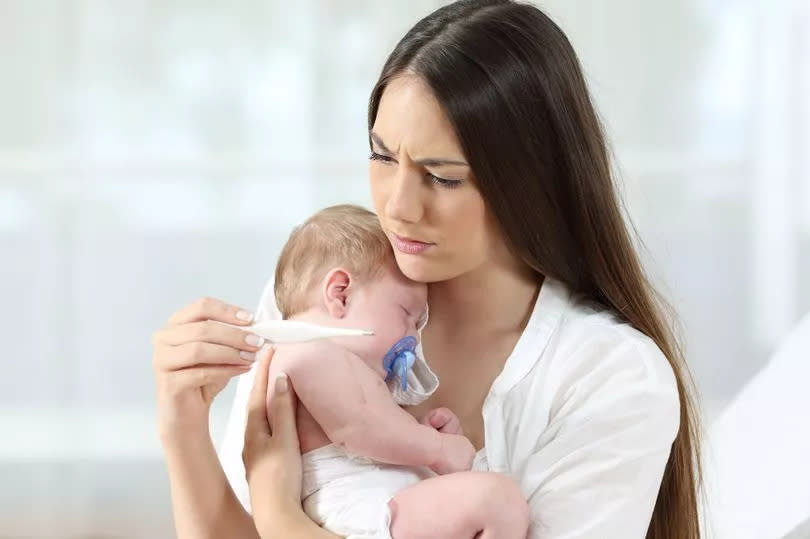Whooping cough outbreaks mapped after eight babies die

There have been nearly 5,000 cases of whooping cough reported so far this year, and eight babies have died - yet the infection rate is sadly continuing to grow.
The UK Health Security Agency (UKHSA) revealed last month that five babies died in England after becoming infected with whooping cough in the first three months of the year. In its latest update, the UKHSA has said another three babies have died.
It comes as lab tests have confirmed 4,793 whooping cough infections in England alone between January and April. That is more than five times as many confirmed cases as there were during the whole of 2023 (858) and the highest since the last major outbreak in 2012.
Read more: Map shows most and least expensive places to buy a house in Merseyside
According to reports, just under half of cases so far this year have been in children under the age of 15 (49%) - that includes 181 cases in babies under the age of three months. To put it into perspective, at this point during the 2012 outbreak, only 101 babies had been infected.
Separate figures show that the UKHSA has received more than 31,000 notifications of suspected whooping cough cases in England and Wales so far this year, including 4,360 in the last three weeks up to June 2. These are alerts that GPs are required to send to the UKHSA every time they diagnose a case of what they believe to be whooping cough - our map shows the suspected outbreaks near you
You can see the suspected cases near you with our interactive map below..
While these notifications are of suspected cases that lab tests have not yet confirmed, they provide an early warning of possible outbreaks.
In the last three weeks, more possible cases have been diagnosed in Bristol (144) than anywhere else in England and Wales, followed by Sheffield (88) and then Nottingham (85). Bristol has now seen the most suspected cases all year with 387, followed by Nottingham (340) and Cardiff (252).
Cases have reportedly been rising due to a "combination of factors," including the cyclical nature of the disease and the impact and isolation of the Covid-19 pandemic which led to reduced immunity in the population. Vaccine uptake has also fallen in recent years - leaving many children unprotected from the infection; and four in 10 expectant mothers do not take the maternal pertussis vaccination, which protects unborn babies from whooping cough, while about one in 12 infants do not receive the 6-in-1 jab by their first birthday.
The UKHSA said: "In the 12 years prior to the introduction of maternal pertussis vaccination in October 2012, 63 deaths occurred in babies aged under one year with confirmed pertussis.
"Since the introduction of pertussis vaccination in pregnancy, from 2013 to the end of April 2024, there have been 29 deaths in babies with confirmed pertussis who were all too young to be fully protected by infant vaccination. Sadly, this includes eight deaths in infants who had contracted pertussis between January and April 2024. Of the 29 infants that died, 23 had mothers who were not vaccinated in pregnancy."
Whooping cough is sometimes known as the '100 day cough' due to the length of time it takes to shake it off. It's a bacterial infection of the lungs and breathing tubes and spreads very easily, sometimes causing serious problems.
Pharmacist Navin Khosla, of NowPatient, said: "For many years, whooping cough has been known as an infection which mainly affects children who haven’t been vaccinated and although cases are still mostly amongst children, whooping cough can infect adults who have been vaccinated, but the protection from the vaccine has started to fade.
"In most cases, whooping cough will present symptoms very similar to a common cold, such as a runny nose and a sore throat, but these symptoms will intensify over the course of a week. Around seven days after being infected with whooping cough, longer coughing bouts will take hold and are most common during the night. As well as this, the intensity of the coughing bouts can cause breathing difficulties and produce thick mucus.
"The best protection against whooping cough is to have children vaccinated and for adults to accept booster vaccines where applicable. However, if you do become infected and experience symptoms including vomiting, difficulty breathing and you notice your face turning red or blue, seek medical attention. In most cases, a course of antibiotics will be prescribed by your GP, but the symptoms could last several weeks or months."
NHS National Medical Director, Professor Sir Stephen Powis, has issued a warning to new mums, he said: "If you are pregnant and have not been vaccinated yet, or your child is not up-to-date with whooping cough or other routine vaccinations, please contact your GP as soon as possible, and if you or your child show symptoms ask for an urgent GP appointment or get help from NHS 111."
Don't miss the biggest and breaking stories by signing up to the Echo Daily newsletter here

 Yahoo News
Yahoo News 
